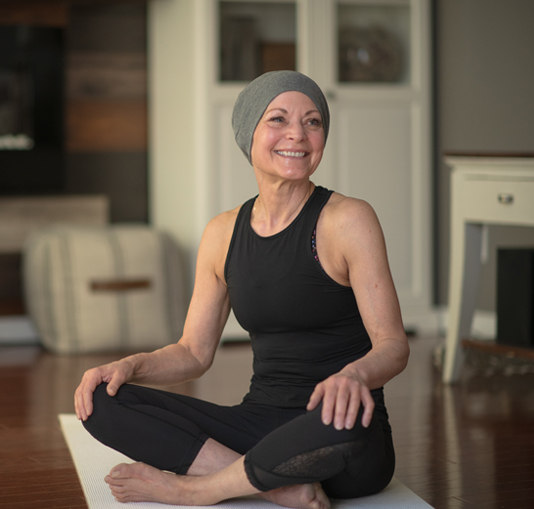
WHAT IS MEDICAL YOGA THERAPY?
“Yoga therapy is a self-empowering process, where the care-seeker, with the help of the Yoga therapist, implements a personalized and evolving Yoga practice, that not only addresses the illness in a multi-dimensional manner, but also aims to alleviate his/her suffering in a progressive, non-invasive and complementary manner. Depending upon the nature of the illness, Yoga therapy can not only be preventative or curative, but also serve a means to manage the illness, or facilitate healing in the person at all levels.” TKV Desikachar & Kausthub Desikachar.
“Yoga therapy is the adaptation of yoga practices for people with health challenges. Yoga therapists prescribe specific regimens of postures, breathing exercises, and relaxation techniques to suit individual needs. Medical research shows that Yoga therapy is among the most effective complementary therapies for several common ailments. The challenges may be an illness, a temporary condition like pregnancy or childbirth, or a chronic condition associated with old age or infirmity.” Robin Monro, Ph.D. Yoga Biomedical Trust (England)
Areas of Expertise

Low Back, Spine and Joint Rehabilitation including:
Bulging & herniated discs, Degenerative disc diseases, scoliosis, SI joint, Stenosis, Spondylolisthesis, Sciatica among others.
Benefits Are:
- Relieves a variety of different levels of pain
- Invite healthy curves of the spine to counter rounding upper back and forward head
- Strengthens weak muscles & Loosens chronic contraction
- Increase circulation and mobility
- Imbibe discs with fluids
- Create functional movements patterns

Cancer Recovery
Help and support the individuals diagnosed with cancer and customize a plan to optimize their treatment and slow advancing disease symptoms using yoga techniques & tools to decrease suffering and empower them to progress toward greater health and freedom from disease.
Benefits Are:
- Boosts immune system to help you fight cancer and recover from treatment side effects
- Reduces chemotherapy-induced nausea and vomiting, hot flashes, cognitive impairment, and fatigue
- Relieves and reduces fear, anxiety, and depression to optimize healing
- Stretches and gently strengthens muscles
- Relaxes and restores the nervous system, improving quality and quantity of sleep
- Provides tools to reacquire a feeling of control over the healing process

Heart Disease Recovery
Cardiac rehabilitation is a program designed to help people recovering from heart disease get back on the road to heart health. In fact, rehab can do a lot to speed your recovery and reduce your chances of future heart problems.
You may benefit if you have or have had a:
- Heart attack or heart surgery
- Coronary artery disease (CAD), angina or heart failure
- Coronary artery bypass graft (CABG) surgery, angioplasty, stenting, valve replacement or a
- pacemaker or implantable cardioverter defibrillator (ICD)

PTSD, Chronic Pain, depression Relief
Helping individual to meet each moment of your life with unshakable peace and wellbeing, no matter how challenging or difficult your situation through iRest, a meditation practice based on the ancient tradition of Yoga Nidra and adapted to suit the conditions of modern life.

Stress, anxiety and Sleeping Disorders Relief
“The World Health Organization (WHO) estimates that 80% of Non-Communicable Diseases (NCD) deaths are due to four main disease types: cardiovascular disease, cancer, diabetes, and respiratory diseases. Unfortunately, lifestyle is the major causative factor in NCDs, including tobacco use, sedentary lifestyle, lack of regular exercise, unhealthy diets and chronic psychosocial stress. Chronic inflammation and stress are a common factor of many of the NCDs, and an area where yoga has been found to be extremely beneficial.”
Accordingly, Meditation practices & aspects of yoga are ways of training the mind so that one is not distracted and caught up in its endless churning thought stream. These practices build resilience, help the person to cope with stress and manage potential triggers for anxiety. If necessary, anti-anxiety medications and/or psychotherapy may be used in tandem; yoga therapy in such cases is strongly adjunctive and complementary the understanding that the nature of yoga is to find one’s eternal Self of health, peace and well-being.

Aging
Aging Yoga Therapy is an integrative medicine approach that EMPOWERS people living with Parkinson’s Disease to regain a sense of control of their aging minds, bodies, and spirits.
Yoga Therapy provides tools to help older adults with ailments and challenges that often come with aging and helps to build confidence, maintain independence, and enhance their quality of life.
Benefits:
- Improves balance, coordination, and movement reducing risk of falls
- Strengthens muscles to protect from bone disease
- Lowers blood pressure and boosts overall cardiovascular health
- Relieves a variety of different levels of pain, specifically pain from arthritis
- Improves posture to counter rounding shoulders and forward head
- Relaxes and restores the nervous system, improving quality and quantity of sleep
- Decreases anxiety, fear, and depression
- Improves memory
FAQ
Will my Yoga Therapist work with my doctor and other health providers?
With your consent, your Yoga Therapist will contact your Health Care Provider with an outline of your Yoga Therapy Program and Progress Notes as you work together.
Your Yoga Therapist creates a specialized and tailored therapeutic plan for you that supports any prescriptions, may help mitigate side effects of treatments, recommendations, or treatments that your Provider may be treating you for.
Will my insurance pay for Yoga Therapy?
It varies. If you are working with a Yoga Therapist in a clinic or hospital, your insurance may reimburse you OR the Health Care Provider may submit your claim for your specific condition to be paid and then pay the Yoga Therapist. For example: Yoga Therapy for specific back pain, Cancer, and Cardiac Rehabilitation may be covered.
If you have a Flex Health Care Spending Account or a Health Spending Account, your Yoga Therapist may accept that for payment and provide you an invoice or a receipt for payment for your records.
The International Association of Yoga Therapists (IAYT) is currently working on this issue with policy makers and insurance companies to support broader coverage of Yoga Therapy.
* The IAYT is currently working on this issue with policy makers and insurance companies to include broader coverage of Yoga Therapy. visit the www.iayt.org
What is the difference between Yoga Therapy and a yoga class?
A hallmark that differentiates yoga therapy from yoga classes is the presence of an individual intake and assessment for each person from Yoga Therapy session prior to commencing the class, personalization of the practice (s) based on the individual assessment, and re-assessment at regular intervals through out a series of classes.
You will work with a Certified Yoga Therapist that will create and tailor sessions for you based on your condition, disease, physical, and emotional state. In addition; develop and implement a self-empowering therapeutic plan appropriate for your needs and oriented around prevention and health promotion and/or provide advice within the Yoga framework based on your needs, life circumstances, and dietary advice or adequate referrals. Yoga Therapists work as part of an Integrative Medical Team to support you.
Yoga Therapists draw from the principles of yoga and the full range of yogic practices and assessment skills. One of the most important philosophies in the Yoga Tradition, is that each person is viewed as a multi-dimensional being that includes your body, breath, mind, emotions, and their interactions.
The overarching goals of Yoga Therapy include eliminating, reducing, and/or managing symptoms that cause suffering; improving function; helping to prevent the occurrence or recurrence of underlying causes of illness; and moving toward overall improved health by bringing forward the body’s natural healing abilities.
Yoga Therapists have undertaken specialized training beyond that of a Yoga Teacher to take a holistic view of their clients beyond the physical aspects. Included in that training is over 1000 hours of education and clinical practice to gain a deep level of expertise in the body, both the anatomy and physiology, how to help with mood disorders, grief, trauma, people with cancer or cardiac conditions, the aging body, including seniors and the elderly, addiction, pain, and many more.
Yoga Therapists are certified by the International Association of Yoga Therapists and will have a C-IAYT behind their name if credentialed.
In addition, your Yoga Therapist has a basic understanding of health reports and may ask to review those with you depending on your needs.
If there is any concern; your Yoga Therapist will also likely request a letter to clear you, medical referral, or other communication from your Provider, saying that they agree with the plan and that Yoga Therapy would support their treatment plan for you.
How many times will I need to come?
It varies. Your condition, disease, and overall therapeutic plan will dictate what and how your sessions are created, including the number of times per week or length of time.
For example, the published literature suggests for people with breast cancer, a minimum of 2 times/week for 60 minutes provide substantial benefit for managing side effects of treatment, whereas for people rehabilitating after heart by-pass surgery, the recommendations are 5 days/week for 60 minutes for a minimum of 12 weeks, along with other interventions.







